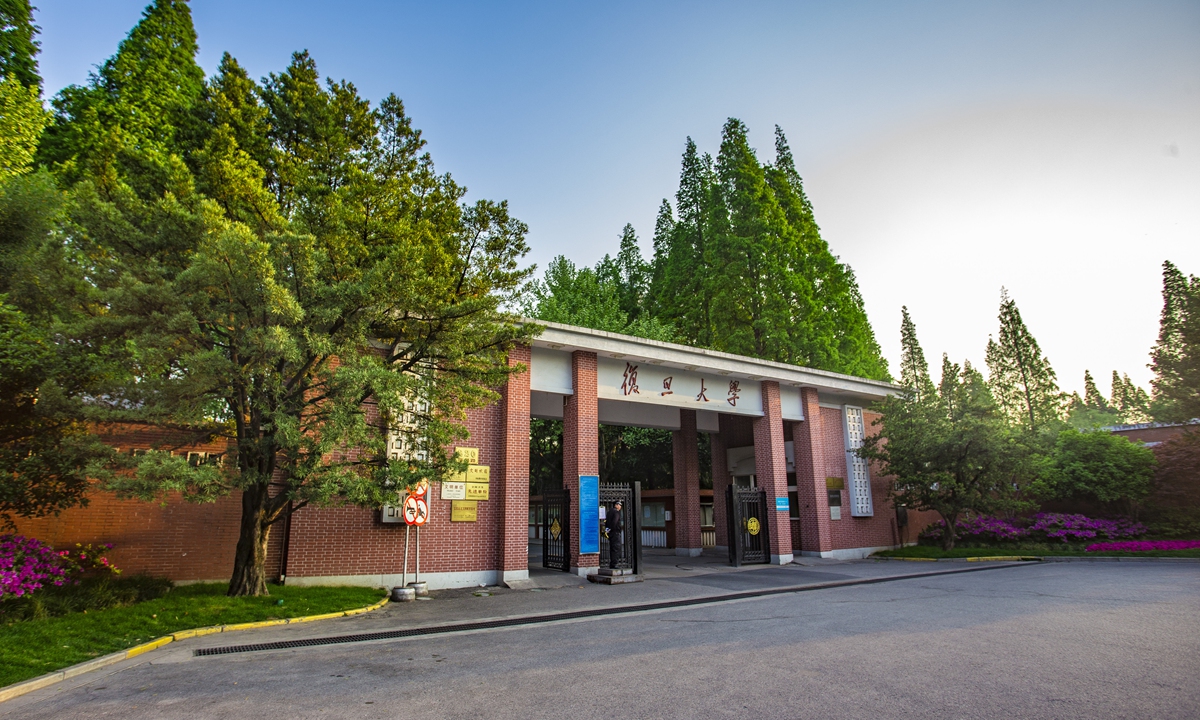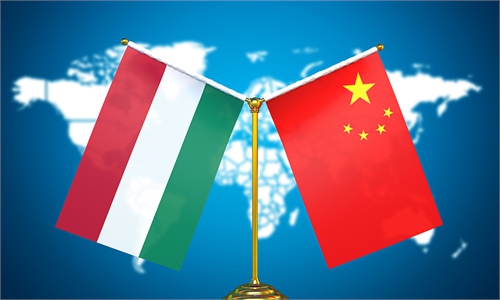IN-DEPTH / IN-DEPTH
Education olive branch from China used as tool of political smear campaign by Hungarian opposition politicians
Obstruction to learning

The Fudan University located in Shanghai, China Photo: VCG
Antagonistic forces are seldom lone actors in fanning anti-China sentiments. This time, Budapest became a new battleground with flashpoint being the construction of a satellite campus of one of China's most illustrious universities.
On June 5, thousands took to the streets in Budapest in opposition to the construction of the Fudan University's satellite campus, which is planned for completion by 2024, citing issues including a $1.5 billion construction loan from a Chinese bank, and the earmarked land for the project initially intended for student housing.
However, the staged public outcry has invariably turned out to be the latest stunt from an anti-China camp. A variety of subversive groups - separatists from Tibet, the island of Taiwan, and scholars with close ties to American-funded Sino-skeptical think tanks - and their involvement in the march is not only blatantly conspicuous but is in response to appeals by Budapest's mayor Gergely Karacsony from the opposition party Dialogue for Hungary.
Anti-China extravaganza
In a move meant to doubtlessly antagonize China, Karacsony plans to christen three different streets near the planned campus "Free Hong Kong Road", "Dalai Lama Road", and "Uighur Martyr's Road" in an attempt to highlight baseless claims of human rights violations allegedly committed by China. It is the same brand of antagonism that was undoubtedly a key component in the fomenting of the June 5 protests in the Hungarian capital.
His antagonism toward China partly stems from his recent ambition to take over the country's leadership to become prime minister, which prompts him to wage attacks against the incumbent government's China policy. Misleading voters and creating confrontation over the Fudan University project has become his gimmick, observers have pointed out.
Observers of Eastern European politics told the Global Times that Karacsony's party is young and aims at new leadership positions through the upcoming election in coalitions with other opposition parties. Human rights and freedoms have transformed into important weapons in political infighting in some Eastern European countries, where opposition parties earn votes by flaying ruling parties on their China policy, a similar scenario also in the Czech Republic.
For example, when Hungary's current government repeatedly blocked European Union sanctions against China over affairs related to Xinjiang and Hong Kong regions, Karacsony unequivocally tweeted his support for the island of Taiwan's participation in the World Health Assembly and praised the island's performance in the fight against COVID-19, a baffling move given the island's soaring confirmed cases due to separatist-oriented Tsai Ing-wen's neglect and politicization of the epidemic.
In the case of Fudan's satellite campus, Karacsony and his colleagues actively engaged in a smear campaign from the very start.
At a conference on May 17, Karacsony complained that Fudan's satellite campus "would pose a very serious national security risk" to Hungary.
National security risk - another familiar excuse repeatedly abused by the United States - became a tool for Karacsony's groundless accusations.
Some political parties in Eastern European Union take extremely strong positions against communists. This hostility has been exploited by some politicians for personal political gain, Zhang Hong, an associate research fellow at the Institute of Russian, Eastern European, and Central Asian Studies of the Chinese Academy of Social Sciences, told the Global Times.
Hungary's MTI news agency quoted Tamas Schanda, a deputy government minister, as saying the protest was unnecessary. He also dismissed "political hysteria" based on unfounded gossip and media reports.
To echo Karacsony's concerns of espionage through the planned project, Peter Kreko, director of the Budapest-based think tank Political Capital, further stressed that "Hungary has become something of a spy hub for Russian and Chinese spies because of ... the lack of willingness of intelligence forces to push back malignant foreign influence" on his Twitter.
Kreko, a former fellow at the National Endowment for Democracy (NED) - a veteran anti-China foundation financed by the US government - is another "China threat" advocate behind the protests.
He is also a fellow at NED-funded Center for European Policy Analysis, and has demonized China numerously as "underlining open knowledge" and eroding Hungary's "economic sovereignty." He has long criticized Beijing and Moscow for "undermining Western democracy."
Kreko frequently interacts with US Congress-invested and NED-funded organization Alliance of Democracies, which was put on the sanctions list by the Chinese government due to its groundless smears.
The US embassy also took the opportunity to meddle. A statement released by the US Embassy in Budapest to the Hungarian newspaper Magyar Hang unsurprisingly decried the Fudan project, alleging, "The possible opening of Fudan University's first campus in Europe is a cause of concern, as Beijing has a proven track record of using its higher-education institutions to gain influence and stifle intellectual freedom."
In recent years, the US has led its allies to become more ideologically hostile to China, which has led to an unhealthy political environment in Europe and some deep-rooted prejudices against China. Karacsony and Kreko are representatives of American interests, said observers.
Separatist Tibetan group flags were also clearly visible at the protest. But many of the flag-bearers did not look like Tibetans, but rather European. "It reminds me of the street protests in Hong Kong, which hired a lot of local people to be anti-China advocates," a Sina Weibo user commented.
These anti-China activists are ganging up to take advantage of the chaos. But they are by no means the dominant voice. The economic and trade cooperation between China and Hungary at higher levels, the joint efforts to tackle climate change, fight terrorism, and oppose US unilateralism remain the mainstream consensus, experts say.

The view of Budapest, Hungary Photo: VCG
Result of EU political infighting
The animus toward China's investment in Europe faces opposition as high up as the European parliament, with Canadian-born Hungarian European Union Member of Parliament Katalin Cseh from Hungary's Momentum Movement party admitting to media that she had asked EU foreign policy chief, Josep Borrell, to prevent the establishment of Fudan's satellite campus in Budapest, claiming the campus posed a wider risk to the European bloc though she couldn't provide any concrete evidence to bolster this claim.
The proposal to set up a branch of China's Fudan University in Budapest was agreed upon in December 2019, the largest investment in Hungary's education sector in recent decades. The media reported that the satellite campus plan originated from the educational cooperation between Fudan University's School of Economics and the Hungarian Central Bank who expanded a well-running cooperative degree program to the new campus.
"This in itself is a matter of diversifying Hungarian education. But voices of a 'China threat' try to bring concern from the EU that China is dividing Europe… The 'China threat' has become a cheap political tool in some small parties," said Zhang.
Against this backdrop, Hungarian Prime Minister Victor Orban has fast become a thorn in the EU's side in recent years.
The leader of Hungary continues to gain popularity in his home country, with his continued cooperative ties to China.
In recent months, Orban and his party have continued to earn EU, UK, and US rancor as he was the only holdout in an EU vote aimed at joining forces with the UK and the US in condemning China for alleged human rights violations in Xinjiang. This was following a sanctions war waged by the EU against China, described by Hungarian Foreign Minister Peter Szijjarto as "pointless, self-aggrandizing, and harmful."
Orban's continued partnership and cooperation with China has seen a marked shift in Hungary's epidemic response. Hungary remains the only EU member state to approve both China's Sinopharm and Russia's Sputnik V vaccines - vaccines yet to be approved by the EU bloc - achieving a national vaccination rate of 40.8 percent fully vaccinated as of June 5, third behind Malta at number 1 and the UK at number 2.
It is clear that Eastern European ruling parties are pragmatists in their dealings with China, said Zhang.
Western European countries grabbed the most of the capital and market advantages, so Eastern European countries hope to improve their own economies through cooperation with China, upon China's strong willingness to invest overseas, Zhang added.
The Hungarian prime minister appeared to suspend the plan and offered to hold a referendum on the project, which reflects the hurdles ahead in ties between China and Hungary marred by a few opposition politicians' ulterior motives to hijack China-Hungary and China-EU relations.
Experts say this does not represent a setback for China's education overseas. "The expansion of Chinese education abroad has always been emphasized as a 'trial.' Does the United States have fewer rejections for its global outreach? The suspected suspension of the Hungarian project shows that China respects the host country and attaches importance to dialogue in the process, said Zhang.


